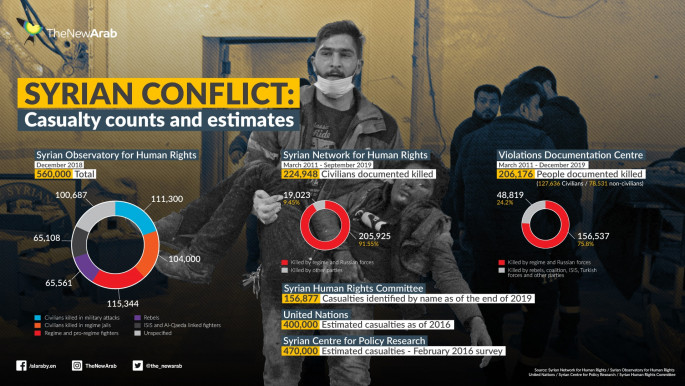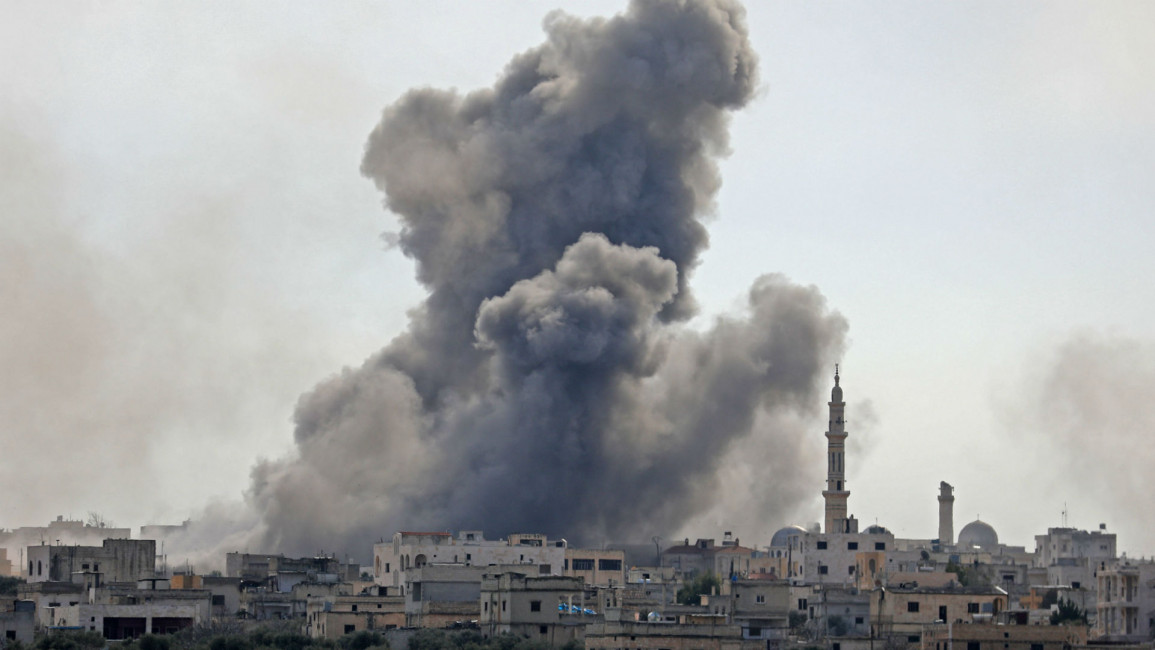UN Security Council to hold emergency session on Syria, Turkey clashes
UN Security Council to hold emergency session on Syria, Turkey clashes
The UN Security Council have called an emergency meeting following the deteriorating situation in Syria between Turkish and Syrian forces.
3 min read
Fighting in Idlib continues to intensify [Getty]
The UN Security Council will meet on Thursday for an emergency session on Syria following clashes between Turkish forces and forces loyal to Bashar al-Assad's regime, diplomats said on Wednesday.
They said the meeting was requested by the United States, France and Britain. UN envoy for Syria Geir Pedersen is expected to report on the situation in Idlib, the northwestern Syrian province, where the two armies clashed on Monday, the diplomats said.
This comes following intense fighting between Turkish forces and the Syrian regime armies – the fiercest since the deployment of Turkish troops in Syria in 2016.
At least five Turkish soldiers were killed and three military personnel following shelling by the regime in Idlib.
In response, Turkey struck more than 50 targets and killed 76 Syrian soldiers.
A final stand
Syrian regime and Russian forces launched what appeared to be a preliminary attack on the city early on Wednesday.
Syria Weekly: Assad regime celebrates capture of Maarat Al-Numan, an Idlib ghost town
Syrian opposition military sources told The New Arab’s Arabic-language service that Russian planes were bombing the road between Idlib city and the village of Qumenas, six kilometres southeast of the city.
Regime forces on Tuesday advanced to within eight kilometres of opposition Idlib city, the provincial capital.
Regime forces on Tuesday also recaptured the village of Nayrab one day after opposition forces drove them out. The military sources said that regime forces were trying to advance from Nayrab to Qumenas amid heavy fighting with opposition forces.
Turkish President Recep Tayyip Erdogan stated that he "would not allow" Syrian regime troops to advance further in Idlib.
On Wednesday, Erdogan also warned the Syrian regime against attacking the Turkish observation posts in Idlib province.
"If the regime does not pull back, Turkey will be obliged to take matters into its own hands."
'Unprecedented' humanitarian crisis
Fighting in Idlib, the last area in the country under opposition control, intensified in recent weeks amid "unprecedented" mass displacement, said the World Health Organisation (WHO).
Nearly 520,000 Syrians have been forced to leave their homes since 1 December, and as of 31 January at least 53 health facilities had suspended services due to insecurity, threats of attacks or the fact that entire areas have been rendered empty as civilians seek refuge from the heavy bombardment.
WHO said its team on the ground would increase the number of mobile clinics that can follow the movements of people fleeing, which are less likely to be attacked.
So far in 2020, two separate attacks on health care have been verified, both in the northwest, claiming 10 lives and injuring 30.
"The current situation in northwest Syria – characterised by lack of access and medicine, insufficient hygiene, chaos and mass displacement - poses a significant risk of outbreaks of measles, diarrheal diseases and other diseases," said Brennan.
The senior official said it was "striking" that in the case of Idlib, where Syrian Government forces plus their allies Russia and others are battling the last remaining rebel fighters, "the enormous humanitarian needs are being largely ignored by the international media and governments".
"Northwest Syria represents one of the world's most severe humanitarian crises, where civilians are suffering on an extraordinary level," he said.
"Humanitarian agencies can only do so much. What we need is a renewed international commitment to bring an end to this protracted and devastating crisis."
They said the meeting was requested by the United States, France and Britain. UN envoy for Syria Geir Pedersen is expected to report on the situation in Idlib, the northwestern Syrian province, where the two armies clashed on Monday, the diplomats said.
This comes following intense fighting between Turkish forces and the Syrian regime armies – the fiercest since the deployment of Turkish troops in Syria in 2016.
At least five Turkish soldiers were killed and three military personnel following shelling by the regime in Idlib.
In response, Turkey struck more than 50 targets and killed 76 Syrian soldiers.
A final stand
Syrian regime and Russian forces launched what appeared to be a preliminary attack on the city early on Wednesday.
Syria Weekly: Assad regime celebrates capture of Maarat Al-Numan, an Idlib ghost town
Syrian opposition military sources told The New Arab’s Arabic-language service that Russian planes were bombing the road between Idlib city and the village of Qumenas, six kilometres southeast of the city.
 |
Regime forces on Tuesday advanced to within eight kilometres of opposition Idlib city, the provincial capital.
Regime forces on Tuesday also recaptured the village of Nayrab one day after opposition forces drove them out. The military sources said that regime forces were trying to advance from Nayrab to Qumenas amid heavy fighting with opposition forces.
Turkish President Recep Tayyip Erdogan stated that he "would not allow" Syrian regime troops to advance further in Idlib.
On Wednesday, Erdogan also warned the Syrian regime against attacking the Turkish observation posts in Idlib province.
"If the regime does not pull back, Turkey will be obliged to take matters into its own hands."
'Unprecedented' humanitarian crisis
Fighting in Idlib, the last area in the country under opposition control, intensified in recent weeks amid "unprecedented" mass displacement, said the World Health Organisation (WHO).
 |
| Idlib is experiencing an 'unprecedented' exodus of citizens as they flee [Getty] |
WHO said its team on the ground would increase the number of mobile clinics that can follow the movements of people fleeing, which are less likely to be attacked.
So far in 2020, two separate attacks on health care have been verified, both in the northwest, claiming 10 lives and injuring 30.
"The current situation in northwest Syria – characterised by lack of access and medicine, insufficient hygiene, chaos and mass displacement - poses a significant risk of outbreaks of measles, diarrheal diseases and other diseases," said Brennan.
The senior official said it was "striking" that in the case of Idlib, where Syrian Government forces plus their allies Russia and others are battling the last remaining rebel fighters, "the enormous humanitarian needs are being largely ignored by the international media and governments".
"Northwest Syria represents one of the world's most severe humanitarian crises, where civilians are suffering on an extraordinary level," he said.
"Humanitarian agencies can only do so much. What we need is a renewed international commitment to bring an end to this protracted and devastating crisis."


![President Pezeshkian has denounced Israel's attacks on Lebanon [Getty]](/sites/default/files/styles/image_684x385/public/2173482924.jpeg?h=a5f2f23a&itok=q3evVtko)



 Follow the Middle East's top stories in English at The New Arab on Google News
Follow the Middle East's top stories in English at The New Arab on Google News


